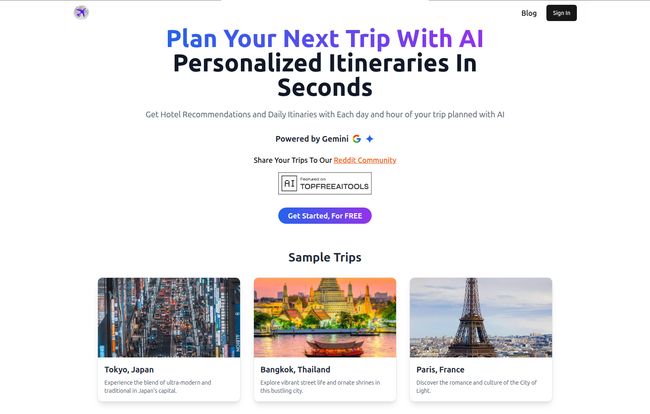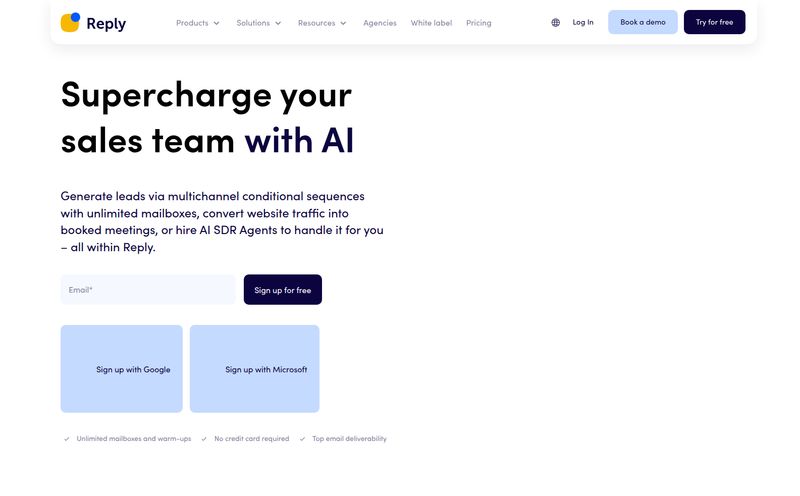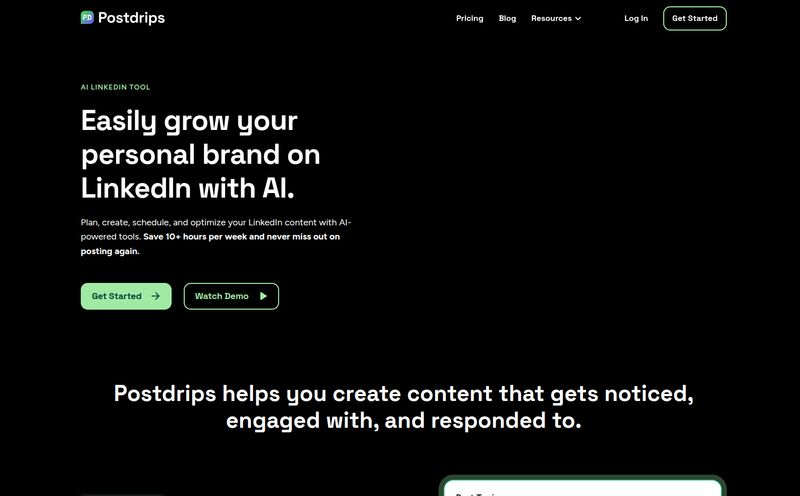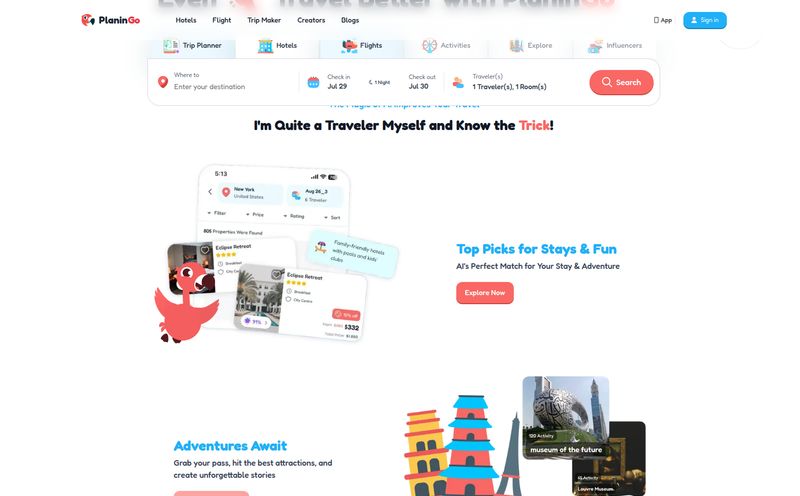Planning a trip can feel like a second job. You start with a spark of inspiration—say, a photo of Tokyo's neon-drenched streets or the tranquil temples of Bangkok. But that spark quickly gets buried under an avalanche of browser tabs. One for flights, three for hotels, twenty-seven for "best hidden gems in Paris," and another one for a Reddit thread debating which neighborhood has the best croissants.
It's exhausting. I've spent more hours than I'd like to admit falling down these travel-planning rabbit holes, only to end up with a messy spreadsheet and a mild headache. It’s the classic analysis paralysis. So when a tool pops up promising to do the heavy lifting for me, using AI, in seconds? My curiosity is officially piqued.
Enter Moon Trip. It’s a new AI travel planner on the block, and its claim is bold: a complete, personalized itinerary in under 20 seconds. As someone who lives and breathes digital trends, I had to see if it lived up to the hype.
So, What is Moon Trip Anyway?
At its heart, Moon Trip is a ridiculously straightforward web tool. It’s not trying to be a clunky, all-in-one booking engine. Its mission is singular: to give you a solid travel plan, fast. You give it three simple things: a destination, how many days you'll be there, and a rough budget (low, medium, or high).
Then, you hit go. Behind the scenes, Google's Gemini AI—which is a pretty big deal in the AI world—gets to work. In less time than it takes to make a cup of coffee, it spits out a full day-by-day, hour-by-hour itinerary, complete with activity suggestions and even hotel recommendations that fit your budget. It's like having a hyper-efficient travel assistant in your pocket, one that doesn't need coffee breaks.

Visit Moon Trip: AI Travel Planner
The Great Travel Planning Showdown
The homepage for Moon Trip lays out a fascinating comparison between three ways of planning a trip. It got me thinking about how we all approach this. It really boils down to a choice between AI speed, DIY control, or an agent's expertise.
The Case for AI Planners Like Moon Trip
The biggest win here is speed. Instant itineraries are a game-changer, especially for spontaneous trips or for people who just want a starting point. It’s available 24/7, offers suggestions you might not have found on page 10 of a Google search, and it’s incredibly cost-effective (more on that later). Having a tool that gives you real-time updates and personalized ideas without the endless searching is a massive weight off your shoulders. It cuts through the noise.
The Old-Fashioned Way: Planning It All Yourself
I get it. For some, the planning is half the fun. You get to feel a sense of ownership and discovery. But let's be honest, it's also time-consuming, the sheer number of options can be overwhelming, and it’s easy to miss a crucial detail or a must-see spot. The stress of trying to stitch together a perfect trip can sometimes overshadow the excitement of actually going.
What About Human Travel Agents?
A good travel agent is worth their weight in gold. They offer a personal touch and expertise that an algorithm can’t fully replicate. However, that expertise comes at a price. Agents can be expensive, they work on their own schedule (not yours at 2 AM), and there's always the chance of a little bias towards partners they work with. It's a slower, more traditional process.
A Closer Look at Moon Trip's Features
Okay, so it's fast. But is it any good? The itineraries generated by Gemini are surprisingly detailed. For a 3-day trip to Tokyo, it didn't just say "Visit Shibuya." It suggested, "3:00 PM: Head to Shibuya Crossing, watch the scramble from the second-floor Starbucks. 4:30 PM: Explore the surrounding streets for unique fashion boutiques." That's a level of granularity that's genuinely helpful.
The hotel recommendations are also a nice touch, breaking them down by budget. It's not a booking site, just a suggestion list, which I actually prefer. It keeps the tool focused.
But the most interesting feature, in my opinion, is the ability to share your trip to their Reddit community. This is a clever move. It bridges the gap between AI generation and human validation. You can get your AI-crafted plan and then throw it to the wolves—I mean, the lovely people of Reddit—for their feedback, tips, and personal recommendations. It's a smart way to add a human layer to the process.
The Good, The Bad, and The AI-Generated
No tool is perfect, especially a new one. I did see a brief 'application error' once when I was testing it, which just tells me it's a platform that's still growing. Here's my honest breakdown.
What I'm Loving
The time-saving aspect cannot be overstated. It takes the most tedious part of trip planning and automates it beautifully. For someone looking for inspiration or a solid foundation to build upon, it’s fantastic. The interface is clean, uncluttered, and just plain easy to use. No learning curve required. It's a great cure for the 'blank page' problem of travel planning.
Where It Could Improve
Look, if you're a meticulous planner who wants to control every single variable, this might feel a bit limiting. The customization options aren't super deep right now. You get the itinerary, but you can't easily swap activities around within the tool itself. You'd have to do that manually. There's also the risk of recommendations feeling a tad generic. An AI, even a smart one like Gemini, can't know that you secretly hate museums but love weird antique shops. That's where your own personal touch—or the Reddit community—comes in.
Is Moon Trip Free? The All-Important Question
Yes. As of right now, Moon Trip is completely free to use. There's a "Get Started, For FREE" button right on the homepage, and I couldn't find a pricing page anywhere. For a tool this useful, that's a massive plus. I'm not sure if they plan to introduce paid tiers later, but for now, you can generate as many itineraries as you want without spending a dime. In the world of expensive subscription services, that's a breath of fresh air.
Who Is Moon Trip Actually For?
I see a few groups of people who would absolutely love this:
- The Last-Minute Planner: Decided on a weekend trip on a Wednesday? Moon Trip can have a plan ready for you by the time you've booked your train ticket.
- The Inspiration Seeker: Not sure what to do in Rome for five days? Generate an itinerary and see what sparks your interest. Use it as a jumping-off point.
- The Budget-Conscious Traveler: It helps you find activities and hotels that fit your spending level, and the tool itself is free.
- The Overwhelmed Planner: If you're the kind of person who gets stressed by too many choices, this cuts right through the clutter and gives you a clear, actionable plan.
Frequently Asked Questions About Moon Trip
- How exactly does Moon Trip create an itinerary?
- Moon Trip uses Google's Gemini AI. You input your destination, trip duration, and budget. The AI then processes this information, drawing on vast amounts of travel data to build a logical and detailed daily plan with hourly suggestions and hotel ideas.
- Is Moon Trip really free to use?
- Yes, at the time of writing, Moon Trip is 100% free. There are no hidden fees or subscription plans mentioned on their site.
- Can I customize the itinerary Moon Trip gives me?
- Direct customization within the tool is currently limited. The best way to use it is as a strong foundation. You receive the plan, and then you can manually adjust it, ignore parts you don't like, or add your own ideas. The share-to-Reddit feature is also great for getting customization feedback.
- How is this different from just using a travel agent?
- Moon Trip is instantaneous and free, whereas a travel agent offers a more hands-on, personal (and costly) service. Moon Trip provides a data-driven starting point, while an agent provides human expertise, conversation, and booking services.
- What is the Reddit community feature for?
- This feature allows you to take the itinerary generated by the AI and post it to Moon Trip's Reddit community. This way, you can get feedback, tips, and validation from real human travelers who may have visited your destination.
Final Thoughts: Is Moon Trip Your Next Travel Co-Pilot?
I have to say, I'm pretty impressed. Moon Trip isn't trying to replace the joy of personal discovery or the expertise of a seasoned travel agent. Instead, it positions itself as an incredibly powerful first step. It's a co-pilot, not the pilot.
It solves the most annoying problem of travel planning: getting started. It hands you a well-researched, coherent blueprint so you can spend less time stressing over logistics and more time getting excited about your trip. For being a free tool, the value is exceptional. Will I use it for my next trip? Absolutely. At the very least, it'll be the first of my (now much fewer) browser tabs to be opened.



